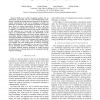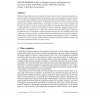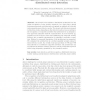182 search results - page 5 / 37 » Activity recognition using temporal evidence theory |
PERCOM
2011
ACM
12 years 11 months ago
2011
ACM
—While most activity recognition systems rely on data-driven approaches, the use of knowledge-driven techniques is gaining increasing interest. Research in this field has mainly...
NIPS
2007
13 years 8 months ago
2007
We present a new and efficient semi-supervised training method for parameter estimation and feature selection in conditional random fields (CRFs). In real-world applications suc...
LOGCOM
2002
13 years 7 months ago
2002
We present a logical approach to plan recognition that builds on Kautz's theory of keyhole plan recognition, defined as the problem of inferring descriptions of high-level pl...
EUROSSC
2007
Springer
14 years 1 months ago
2007
Springer
We describe and evaluate a distributed architecture for the online recognition of user activity sequences. In a lower layer, simple heterogeneous atomic activities were recognised ...
JOCN
2010
2010
Medial Temporal Lobe Activity during Source Retrieval Reflects Information Type, not Memory Strength
13 years 5 months ago
■ The medial temporal lobes (MTLs) are critical for episodic memory but the functions of MTL subregions are controversial. According to memory strength theory, MTL subregions co...



